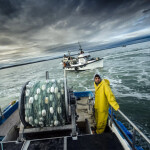There’s lots of money seeking opportunities in China’s food sector: that’s easy to see from the various conferences and networking nights in Beijing and Shanghai, where a plethora of cashed-up Chinese (and some international) venture capital companies size up potential agriculture or food distribution opportunities.
Food is a conundrum for venture capitalists who see the rise in consumption of every protein and high value foodstuff in China, but struggle to find easily actionable opportunities to get exposure to this trend.
Some have invested in dairy companies at home and in Australasia, while others have invested in cold chain and other food distribution firms in China. Among the deals which have happened include U.S. venture capital firm Blackstone taking a 30 percent (for USD 600 million, EUR 513 million) stake in China Shouguang Agricultural Product Logistic Park, one of China’s largest operators of agricultural and seafood refrigerated markets, headquartered in Qingdao.
All too often, however, Chinese interest rates are prohibitively high and access to credit is too difficult for smaller private borrowers, hence the opportunity for funds willing to invest. But why do so few of these venture capitalists want to invest in seafood?
Here are some key reasons:
Fragmentation. Most seafood packagers and processors rely on a complex network of individual suppliers. Quality is variable, transparency is minimal. Many of them exit production in adverse market conditions. All of this is a turn off to investors seeking to do due diligence on a potential investment target.
There is a poor understanding of new trends in aquaculture, such as mariculture. While government has targeted mariculture as a major outlet of growth in seafood production, there hasn’t been a great deal of enthusiasm in the Chinese investment community, which remains wary after an October 2014 wipe-out of scallops that also wiped out profits at Zoneco (Zhangzidao) – one of the country’s leading listed seafood companies.
The lack of insurance coverage of aquaculture (for facilities like shrimp farms). Despite efforts by government to marshal insurance cover for seafood producers, there hasn’t been much bite from insurance companies who are worried over the fragmentation of the sector. With limited understanding of seafood production, China’s predominantly state owned insurers prefer dealing with large entities and, in recent years, have become preoccupied with their new role as investors (they’re now allowed to invest in real estate). Some past cases of fraud also made insurers wary.
There are no nationally recognised brands (though Guolian and Zhangzidao, among others are catching up on this) available for purchase. It’s going to take at least a decade for some of the newer brands, like Ai Chi Yu (owned by Qingdao Spring Foods, a seafood processor turned distribution/trading company) to mature and get real market share. Name recognition isn’t a strong point of China’s seafood sector, and most consumers identify with species which are purchased in restaurants, wet markets and supermarkets. Likewise, there is very little price transparency in the value chain, which worries investors as well as insurers. It’s not clear for would-be investors what piece of the price for seafood products in China is being captured by a shrimp farmer versus a processor.
It’s easier to buy proxy assets. Some big Chinese and global venture capital firms are investing in dairy companies, vineyards and other assets in developed states like Australia, New Zealand, Europe and the United States, with a view to supplying rising Chinese demand without all the risks of valuing and controlling assets in China. Foreign brands have so much more cache and command price premiums, which means investors prefer to buy a food brand with a proven track record in a developed economy that they can introduce to the Chinese market.
Seafood isn’t organic. An organic pork farm is a better bet. Chinese food marketing has become obsessed in recent years with ecology, which is equated with food safety more than sustainability. There are few, if any, certified organic seafood products on sale in China, but there are lots of start-up pork companies breeding local pigs in certified organic conditions demanding a price premium.






